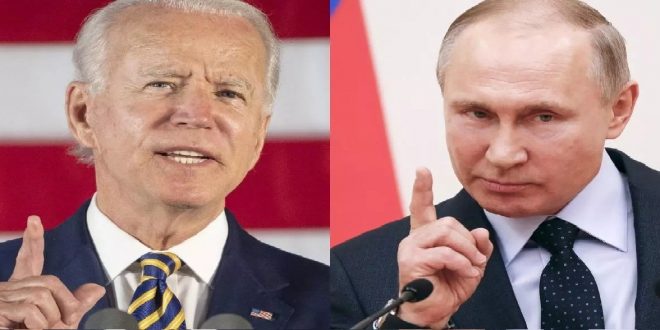16-06-2021
GENEVA/ MOSCOW/ WASHINGTON: US President Joe Biden and Russian President Vladimir Putin are holding their first meeting since Biden took office with wide disagreements likely and expectations low for any breakthroughs.
The pair exchanged a brief handshake in front of reporters on Wednesday in Geneva, before entering a stately lakeside villa for talks.
Putin said he hoped for a “productive” meeting, while Biden said it was “always better to meet face to face”.
The meeting in a book-lined room had a somewhat awkward beginning both men appeared to avoid looking directly at each other during a brief and chaotic photo opportunity before a scrum of jostling reporters.
 Biden nodded when a reporter asked if Putin could be trusted, but the White House quickly sent out a tweet insisting that the president was “very clearly not responding to any one question, but nodding in acknowledgment to the press generally.”
Biden nodded when a reporter asked if Putin could be trusted, but the White House quickly sent out a tweet insisting that the president was “very clearly not responding to any one question, but nodding in acknowledgment to the press generally.”
Putin ignored shouted questions from reporters, including if he feared jailed Russian opposition leader Alexey Navalny.
Both world had said earlier that they hoped their discussions lead to more stable and predictable relations, even though they remain at odds over everything from arms control and cyber-hacking to election interference and Ukraine.
In the hours leading up to the highly anticipated summit, Washington and Moscow were cool on the prospects for significant progress.
“We’re not expecting a big set of deliverables out of this meeting,” a senior United States official told reporters on board Air Force One as Biden flew to Geneva.
The talks are expected to last four to five hours.
“I’m not sure that any agreements will be reached,” said Putin’s foreign policy adviser Yuri Ushakov.
Relations have deteriorated for years, notably with Russia’s 2014 annexation of Crimea from Ukraine, its 2015 intervention in Syria and US allegations denied by Moscow of its meddling in the 2016 election that brought Donald Trump to the White House.
They sank further in March when Biden said he thought Putin was a “killer”, prompting Russia to recall its ambassador to Washington for consultations. The US recalled its ambassador in April. Neither has since returned.
The senior US official said the United States aimed for a set of “tasking” Washington jargon for assigning aides to work on specific issues “about areas where working together can advance our national interests and make the world safer”.
 Arms control is one domain where progress has historically been possible despite a rift.
Arms control is one domain where progress has historically been possible despite a rift.
In February, Russia and the US extended for five years the New START treaty, which caps their deployed strategic nuclear warheads and limits the land and submarine-based missiles and bombers to deliver them.
The US official said Biden would also define areas of vital national interest where Russian misconduct would bring a response. Biden signed an executive order in April giving Washington wide latitude to impose sanctions on Moscow.
Vladimir Frolov, a former Russian diplomat, told Reuters that Putin wanted respectful ties and to be treated like members of the Soviet Politburo were in the 1960s-1980s, with “a symbolic recognition of Russia’s geopolitical parity with the US”.
“In exchange, they (Moscow) would be willing to cut back on some of the loony stuff,” Frolov said, saying he meant “no poisonings, no physical violence, no arrests/kidnappings of US and Russian nationals. No interference in domestic politics.”
Dmitri Trenin, director of the Carnegie Moscow Center think-tank, set the bar for Wednesday’s talks low.
“The principal takeaway, in the positive sense, from the Geneva meeting would be making sure that the United States and Russia did not come to blows physically, so that a military collision is averted,” he said.
 No shared meals, nor joint press conference
No shared meals, nor joint press conference
In a sign of the strained ties, the talks will not include any shared meals and Putin and Biden are expected to hold separate news conferences rather than a joint one.
“No breaking of bread,” said the senior US official.
Journalist Natacha Butler, reporting from Geneva, said a “very tense and probably unfriendly meeting” was expected “but what the two leaders are most likely going to do is try to find some common ground, that could be on the Iran nuclear deal, on climate change or arms control,” she said.
“They’ll have to find some way of opening up communication that’s the goal of this summit. Expectations are pretty low, we are not expecting any big breakthrough, but the fact that they’re meeting here is seen at least as a step in the right direction.”
In contrast to Trump, whose 2018 summit with Putin in Helsinki included a meeting accompanied only by interpreters, Biden and Putin are not expected to have any solo dealings.
Standing beside Putin in Helsinki, Trump refused to blame the Russian leader for meddling in the 2016 US election, casting doubt on the findings of his own intelligence agencies and sparking a storm of domestic criticism.
Biden, Putin, US Secretary of State Antony Blinken and Russian Foreign Minister Sergey Lavrov, along with interpreters, will meet together before being joined by aides for a larger session. (Int’l News Desk)
 Pressmediaofindia
Pressmediaofindia




